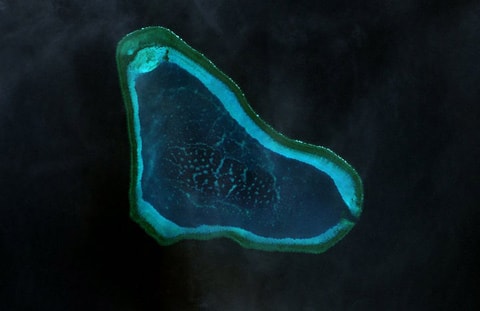The East Sea is the focus of the Asian Security Conference.
Sovereignty disputes in the East Sea will be the most notable topic at the Asia Security Summit, with the participation of top regional and world defense officials.
The conference, organized by the UK-based International Institute for Strategic Studies (IISS), is widely known as the Shangri-La Dialogue, as it takes place annually at the hotel of the same name in Singapore. It is an intergovernmental security forum attended by top regional and global defense officials.
This year's conference takes place from June 1 to 3, with the participation of representatives from 28 Asia-Pacific countries along with the UK, France, Russia and the US. This is the 11th time the Shangri-La Dialogue has been held. The topics of discussion at the conference include military modernization programs, global power balance, regional security architecture, countering transnational threats, and coping with natural disasters. Among these, the issue of sovereignty disputes in the East Sea will be emphasized.
In addition to multilateral dialogue, the Shangri La Dialogue is also an opportunity for senior defense officials from different countries to meet one-on-one.
"Hotspot" of the East Sea On the afternoon of June 2, delegates attending the Shangri-La Dialogue will have a special plenary session, in which the first topic to be discussed is "Restraining disputes in the East Sea". This shows that the East Sea continues to be a topic attracting attention in the region and the world.
 |
| Scarborough Shoal, where a tense dispute is taking place between the Philippines and China. Photo: NASA |
This year’s Shangri-La Dialogue takes place amid diplomatic tensions between China and the Philippines over the sovereignty of the Scarborough Shoal. Both countries have repeatedly sent ships to operate around the uninhabited shoal, with no signs of concession.
Defense News quoted Mr. Tim Huxley, executive director of IISS Asia, as saying that maritime disputes in the East Sea are a major topic at this year's conference. Some countries involved in the East Sea disputes may use the Shangri-La Dialogue to express their views.
Dean Cheng, a China expert at the Washington-based Heritage Foundation, said the US will monitor the reactions of Chinese delegates attending the conference to learn from them the direction of the country's military.
On May 16, China continued to unilaterally impose a fishing ban in the East Sea. Vietnam and the Philippines both protested this ban. Manila even considered imposing its own fishing ban.
Also on May 16, China arrested two fishing boats and 14 Vietnamese fishermen who were fishing in the Hoang Sa archipelago of Vietnam. The fishermen and one fishing boat were later released, but China retained one fishing boat along with all fishing gear and seafood. Vietnamese Foreign Ministry spokesman Luong Thanh Nghi declared China's fishing ban invalid and demanded that China return the fishing boat.
On the eve of the Shangri-La Dialogue, the atmosphere heated up when US Secretary of State Hillary Clinton said that China's claims of sovereignty in the East Sea exceeded the permission of the 1982 United Nations Convention on the Law of the Sea (UNCLOS 1982). In response to this statement, Chinese Foreign Ministry spokesman Hong Lei said that the US is not a party to the disputes in the East Sea.
The US-China balance The US delegation to this year's conference is strong with a strong defense/military trio. For the first time since assuming the role of Secretary of Defense, Mr. Leon Panetta will appear at the Shangri-La Dialogue. After three days in Singapore, Panetta will visit Vietnam and India.
 |
US Secretary of Defense Leon Panetta. Photo: AP |
Other senior US generals who will be in Singapore are Chairman of the Joint Chiefs of Staff General Martin Dempsey and Commander of the Pacific Command General Samuel Locklear. In addition to the so-called "Big Three", the US delegation will also include two Senators, John McCain and Joe Lieberman.
In contrast to the strong presence of senior US officials, this year's Chinese delegation did not include Defense Minister Liang Guanglie, Asia News Network reported. Last year, Liang attended the Shangri-La Dialogue for the first time.
US President Barack Obama announced the new US military strategy earlier this year, which emphasized the gradual shift of focus to the Asia-Pacific region. The US has immediately begun to materialize this shift with plans to deploy troops in Japan and Australia; exercises in the Philippines and Indonesia; the dispatch of ships to Singapore next year; as well as a series of visits by warships to many countries in this region.
Since the US announced the above strategy, China has expressed concern. Chinese media said that this is a show of force, which can even threaten peace and stability in the region.
Recently, China has also sent a series of large-scale ships and equipment to the East Sea, in the context of increasing tensions over sovereignty.
The US-China balance at the Shangri-La Dialogue will help to better visualize the orientation of these two powers towards the Asia-Pacific region.
According to VnExpress - DT
